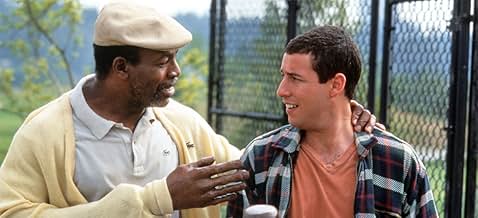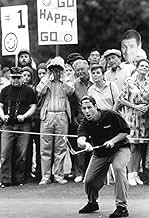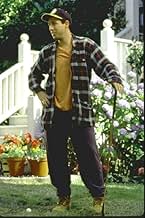Un joueur de hockey rejeté met ses compétences au golf pour sauver la maison de sa grand-mère.Un joueur de hockey rejeté met ses compétences au golf pour sauver la maison de sa grand-mère.Un joueur de hockey rejeté met ses compétences au golf pour sauver la maison de sa grand-mère.
- Réalisation
- Scénaristes
- Vedettes
- Prix
- 1 victoire et 4 nominations au total
Ken Camroux-Taylor
- Coach
- (as Ken Camroux)
Nancy Hillis
- Terry
- (as Nancy McClure)
Avis en vedette
"Happy Gilmore" is the Adam Sandler movie to see. If everyone had to see one Sandler movie before their lives were complete, I would seriously hope this is the movie they see. It's nice to see golf and hockey in a movie again. I don't think there is another movie out there that makes me laugh as much as "Happy Gilmore" does. You have Happy, the ultimate hero, fighting to win a life of security for his grandma. There's Shooter McGavin, the villain you love to hate, who attempts to foil Happy's quest. And then there's Mr. Larson, Happy's 8' tall monster of a former employer, threatening Shooter at every turn. Hey Bob Barker is in this movie! It doesn't get much funnier than Mr. Price Is Right insulting our hero. Well maybe Ben Stiller's part in this movie is funnier, as he corruptly directs a retirement home. It doesn't matter what's the funniest. This whole movie is one hilarious moment after another.
My favorite Adam Sandler movie.
I just think it aligns perfectly with his comic persona. He seems to fit this character perfectly. It's the kind of adolescent silliness that I gravitate toward. I can't tell you how happy I was that my 9 year-old seemed to approve ("That was a very good movie"). And she's way more mature than her old man is.
It's not just the character of Happy Gilmore that's memorable here, but also Shooter McGavin, and Christopher McDonald deserves credit for making the entitled jackass a solid villain. Same for Carl Weathers, and you would think he'd be slumming it here, but he sure doesn't show it.
Best of all? Out-of-Nowhere Bob Barker; secure enough in his celebrity to openly parody it with a free-for-all fistfight.
Tell me "The Price is Wrong, b***h!" isn't one of Sandler's best lines.
I just think it aligns perfectly with his comic persona. He seems to fit this character perfectly. It's the kind of adolescent silliness that I gravitate toward. I can't tell you how happy I was that my 9 year-old seemed to approve ("That was a very good movie"). And she's way more mature than her old man is.
It's not just the character of Happy Gilmore that's memorable here, but also Shooter McGavin, and Christopher McDonald deserves credit for making the entitled jackass a solid villain. Same for Carl Weathers, and you would think he'd be slumming it here, but he sure doesn't show it.
Best of all? Out-of-Nowhere Bob Barker; secure enough in his celebrity to openly parody it with a free-for-all fistfight.
Tell me "The Price is Wrong, b***h!" isn't one of Sandler's best lines.
Adam Sandler may not be the all-round actor who can deliver many different comic performances but he does have a certain comic style. Happy Gilmore is a failed Hockey player who cannot skate and has a lack of any self-discipline. His life seems to be a complete failure until he finds out he can hit a golf ball over 400 yards. At first you might feel little empathy for Happy as he obviously deserves all the bad luck he gets from the way he treats his friends. But the introduction of Shooter to the screen suddenly makes you root for the underdog. The plot is thrown together to get the most out of Sandler and his antics on screen. Some of the scenes are totally unbelievable particularly when a car is driven on to the golf course to run down Happy! But no matter how many times I see the film it can still make me laugh.
Recipe for a prime Adam Sandler comedy: dream up a ridiculous, one-note concept, plaster it with silly side gags, stretch the whole thing to fill ninety minutes and... somehow succeed in spite of yourself. There's no way this rudimentary formula should work so well, but here's Exhibit B, and I'm still laughing.
Sandler in the mid-90s was a roiling ocean of slapstick brilliance, totally superficial and meaningless but all the more endearing for it. Here, of course, he's the brainless hockey player turned golf pro, capable of driving the green on a par five but allergic to any semblance of a short game. It's a role catered to his strengths - quick temper tantrums, wacky fight scenes, childish infatuations - and he still plays them well. All the fleeting extraneous bits land, too, from Carl Weathers's absurdly long false hand to Lee Trevino's frequent, often wordless, cameos to Christopher McDonald's delicious overacting as the stuck-up front runner, Shooter McGavin.
It doesn't look great (actually, the budget must've been pretty tight) but that's hardly the point. This one remains a simple dose of energetic fun, twenty-odd years later.
Sandler in the mid-90s was a roiling ocean of slapstick brilliance, totally superficial and meaningless but all the more endearing for it. Here, of course, he's the brainless hockey player turned golf pro, capable of driving the green on a par five but allergic to any semblance of a short game. It's a role catered to his strengths - quick temper tantrums, wacky fight scenes, childish infatuations - and he still plays them well. All the fleeting extraneous bits land, too, from Carl Weathers's absurdly long false hand to Lee Trevino's frequent, often wordless, cameos to Christopher McDonald's delicious overacting as the stuck-up front runner, Shooter McGavin.
It doesn't look great (actually, the budget must've been pretty tight) but that's hardly the point. This one remains a simple dose of energetic fun, twenty-odd years later.
This film is the one that introduced me to one of my favorite actors, Adam Sandler. His movies are mostly hit-or-miss gag machines, but this is one of his movies in which nearly every gag works. I almost miss the old Adam Sandler. The old Adam Sandler character would be a man who acts nice, but turns violent and angry when he doesn't get his way. Now he plays a mild-mannered every-man who makes little wisecracks. Not that the latter isn't funny, but the former is what he'll always be remembered for, and this is a perfect example of an Adam Sandler's true comedic side.
Happy Gilmore (Adam Sandler) is a nearly unlikeable loser who after a strangely traumatic childhood, grew up to be a raving, anti-social lunatic, who happens to be obsessed with hockey. He constantly tries out for hockey teams, and proudly holds two league records (Most time spent in the penalty box, and he was the only person in history to ever take off his skate and try to stab somebody). One day, his girlfriend dumps him, he doesn't make the hockey team, and the IRS repossesses his grandmothers house which he grew up in. Soon, he discovers that he has an incredible talent for golf, with a record breaking long drive. Unwillingly taken under the wing of one-handed former golf pro Chubbs Peterson (Carl Weathers), and becomes a golf sensation due to his long drive, and extremely rude behavior, much to the dismay of the leading tour money winner, Shooter McGavin (Christopher McDonald). A bitter rivalry and a race-against-time ensue, as Happy tries to earn back his grandma's house, and beat Shooter.
Happy Gilmore is a movie that I truly adore, and will always cherish. There are many quotable lines, and hilariously random scenes and/or characters. One of the funniest ones is a cameo by Ben Stiller as a cold-blooded orderly at an old folks home, who treats the citizens like inmates. One of the funniest comic bits in any Adam Sandler movie is the sequence in which Happy gets into a fistfight with Bob Barker, the host of "The Price is Right." For some reason, Bob fails to notice the heckler who's most frequently uttered word never fails to affect Happy's game for the worst.
Another hilarious thing about this movie is how many of the characters in the movie manage to play their parts and keep a straight face, even when Happy is assaulting innocent people for the smallest reasons, and cussing out the golf ball when it won't go "home." Happy is one of a group of quirky characters in the film, but much of the humor comes from the reactions of the serious characters, and/or the extras when Happy does something stupid. One hilarious example of this is when Happy repeatedly screams out every word that can't be said on TV, well... on TV. The overall premise of the film is fun, and the film delivers non-stop laughs. Sit back and enjoy the classic Adam Sandler vehicle. I highly recommend this film, and give it 10/10.
It is proudly rated PG-13 for Language and Comic Sexuality. Sex: 4/10 Violence: 5/10 Swearing: 5/10 Drugs: 2/10
Happy Gilmore (Adam Sandler) is a nearly unlikeable loser who after a strangely traumatic childhood, grew up to be a raving, anti-social lunatic, who happens to be obsessed with hockey. He constantly tries out for hockey teams, and proudly holds two league records (Most time spent in the penalty box, and he was the only person in history to ever take off his skate and try to stab somebody). One day, his girlfriend dumps him, he doesn't make the hockey team, and the IRS repossesses his grandmothers house which he grew up in. Soon, he discovers that he has an incredible talent for golf, with a record breaking long drive. Unwillingly taken under the wing of one-handed former golf pro Chubbs Peterson (Carl Weathers), and becomes a golf sensation due to his long drive, and extremely rude behavior, much to the dismay of the leading tour money winner, Shooter McGavin (Christopher McDonald). A bitter rivalry and a race-against-time ensue, as Happy tries to earn back his grandma's house, and beat Shooter.
Happy Gilmore is a movie that I truly adore, and will always cherish. There are many quotable lines, and hilariously random scenes and/or characters. One of the funniest ones is a cameo by Ben Stiller as a cold-blooded orderly at an old folks home, who treats the citizens like inmates. One of the funniest comic bits in any Adam Sandler movie is the sequence in which Happy gets into a fistfight with Bob Barker, the host of "The Price is Right." For some reason, Bob fails to notice the heckler who's most frequently uttered word never fails to affect Happy's game for the worst.
Another hilarious thing about this movie is how many of the characters in the movie manage to play their parts and keep a straight face, even when Happy is assaulting innocent people for the smallest reasons, and cussing out the golf ball when it won't go "home." Happy is one of a group of quirky characters in the film, but much of the humor comes from the reactions of the serious characters, and/or the extras when Happy does something stupid. One hilarious example of this is when Happy repeatedly screams out every word that can't be said on TV, well... on TV. The overall premise of the film is fun, and the film delivers non-stop laughs. Sit back and enjoy the classic Adam Sandler vehicle. I highly recommend this film, and give it 10/10.
It is proudly rated PG-13 for Language and Comic Sexuality. Sex: 4/10 Violence: 5/10 Swearing: 5/10 Drugs: 2/10
Le saviez-vous
- AnecdotesBob Barker wasn't sure if he wanted to be in the movie. When he learned that he was going to win the fight with Adam Sandler, he accepted the role.
- GaffesHappy's Plymouth Duster has a sunroof when the lady from the nursing home jumps on the hood. In other scenes the sunroof is missing.
- Citations
Shooter McGavin: [after buying grandma's house in an auction] You're in big trouble though, pal. I eat pieces of shit like you for breakfast!
Happy Gilmore: [laughing] You eat pieces of shit for breakfast?
Shooter McGavin: [long pause] No!
- Générique farfeluThe End appears before the end credits roll.
- Autres versionsHappy's line of "The price is wrong, bitch" is changed depending on the channel. Some versions replace "bitch" with "geek"; others replace it with "Bob."
- ConnexionsEdited into Happy Gilmore: Deleted Scenes (2005)
- Bandes originalesTuesday's Gone
Written by Allen Collins, Ronnie Van Zant
Performed by Lynyrd Skynyrd
Courtesy of MCA Records
Meilleurs choix
Connectez-vous pour évaluer et surveiller les recommandations personnalisées
- How long is Happy Gilmore?Propulsé par Alexa
Détails
- Date de sortie
- Pays d’origine
- Site officiel
- Langue
- Aussi connu sous le nom de
- Adam Sandler's Happy Gilmore
- Lieux de tournage
- sociétés de production
- Consultez plus de crédits d'entreprise sur IMDbPro
Box-office
- Budget
- 12 000 000 $ US (estimation)
- Brut – États-Unis et Canada
- 39 041 354 $ US
- Fin de semaine d'ouverture – États-Unis et Canada
- 8 514 125 $ US
- 18 févr. 1996
- Brut – à l'échelle mondiale
- 41 422 354 $ US
- Durée
- 1h 32m(92 min)
- Couleur
- Mixage
- Rapport de forme
- 1.85 : 1
Contribuer à cette page
Suggérer une modification ou ajouter du contenu manquant














































